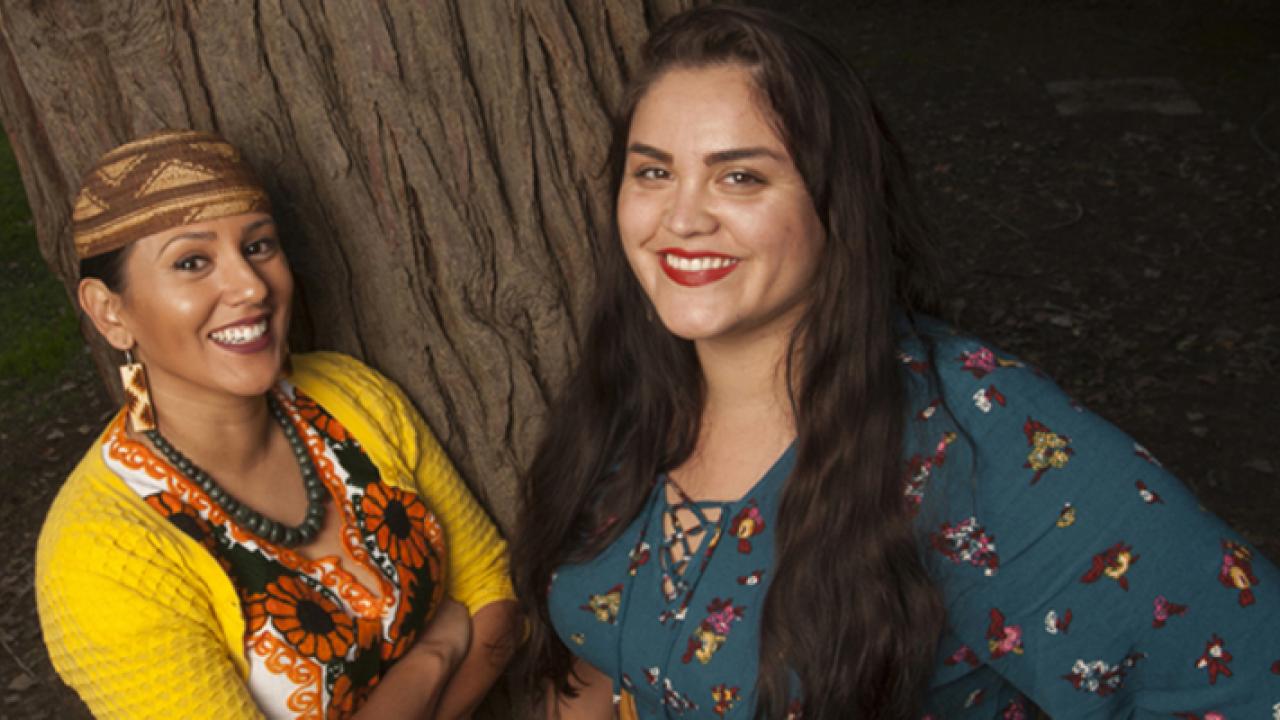
Native American Studies Graduate Students Deepen Understanding Through Public Engagement
For Sarah Biscarra Dilley and Vanessa Esquivido, community interaction is a critical part of academic work. In engaging with the public, fellow students and those who share their cultural heritage, they’ve come to better understand their own research and found strong personal motivations for scholarship.
The Ph.D. students in Native American Studies shared insights into recognition struggles and Indigenous visual culture, creativity and innovation at Roseville’s Maidu Museum and Historic Site last October.
“Sometimes we’re in academia so much that we forget to connect back with other communities. It’s important to have an avenue open and encourage communication but to keep ourselves balanced as well,” Esquivido said. “For the talk, Sarah and I decided to share some of our personal narratives by interweaving them through our research.”
For Esquivido, an enrolled member of the Nor Rel Muk Wintu Nation, Hupa and Chicana, that led to a presentation on how California Native basketry serves as a living history. She said it was a fun break from her dissertation research, which explores the Nor Rel Muk Wintu Nation’s tribal ethno-history, particularly with applying for federal recognition over the past 33 years.
Biscarra Dilley’s academic work aims to create a fuller narrative history of her tribe, the yak tityu tityu yak tiłhini Northern Chumash people. She is particularly interested in the maintenance of identity despite dispossession caused by the California Mission system, extractive industries like oil, as well as land grant education and military institutions. As a visual artist, she translates these narratives at the juncture of place-based, archival and embodied knowledges.
For the talk, Biscarra Dilley shared a creative piece about the process of doing research on one’s own community, which can be emotional and highly personal. Her topic struck a chord with the large group of fellow Native American Studies students who showed their support among the 40 audience members.
 Sarah Biscarra Dilley's visual art "uses found footage,
Sarah Biscarra Dilley's visual art "uses found footage,cut paper, archival material, handwork, language and thread to trace landscapes of resilience."
(Credit: Sarah Biscarra Dilley)
“I think it’s true for a lot of indigenous students, as well as others who come with strong understandings of their heritage and a commitment to their culture(s),” she said. “It’s not like we’re researching a subject that’s detached and distant. It’s not like we’re researching a subject that cannot speak back to us. These are our family members. These are our lived experiences. These are our homelands, and these are our histories.”
Both students reported that the support of their fellow Native American Studies scholars has been an important part of their academic experience.
“I’m the first person in my family to graduate high school,” Esquivido said. In addition to Ph.D. work, she’s balancing being a mom and working a 5 to 10 a.m. daily shift at Costco Wholesale. “In my second year of grad school, I just looked up and said, ‘I don’t even know how I got here.’ This was never the plan. Community really helps. I get so much advice from a group of Native women that I met in the program. We have a group text that started four years ago. We still have it today.”
Biscarra Dilley also said the path to a Ph.D. was meandering. “I didn’t get a master’s degree. I dropped out of high school. I never thought that I was going to be in this position,” she said. It’s important for her that she’s been able to share that with undergraduate students as a Teacher’s Assistant.
“We all have a critical perspective, valuable knowledges from our own lived experiences, and a responsibility to contribute. What matters is how we show up together,” she said.
That mindset is shared by both scholars when it comes to listening to their communities, inviting them to shape their research process.
“We need to make sure we’re going into the communities to not only talk about our research, but to check in and make sure we are listening and giving credit to the voices that are so often silenced,” Esquivido said.
They’re hoping there’ll be more talks in the future.
About UC Davis Graduate Studies
Graduate Studies at UC Davis includes 99 dynamic degree programs and a diverse and interactive student body from around the world. Known for our state-of-the-art research facilities, productive laboratories and progressive spirit – UC Davis offers collaborative and interdisciplinary curricula through graduate groups and designated emphasis options, bringing students and faculty of different academic disciplines together to address real-world challenges.
UC Davis graduate students and postdoctoral scholars become leaders in their fields: researchers, teachers, politicians, mentors and entrepreneurs. They go on to guide, define and impact change within our global community.
For information on Graduate Studies’ current strategic initiatives, visit the Graduate Studies strategic plan page.
